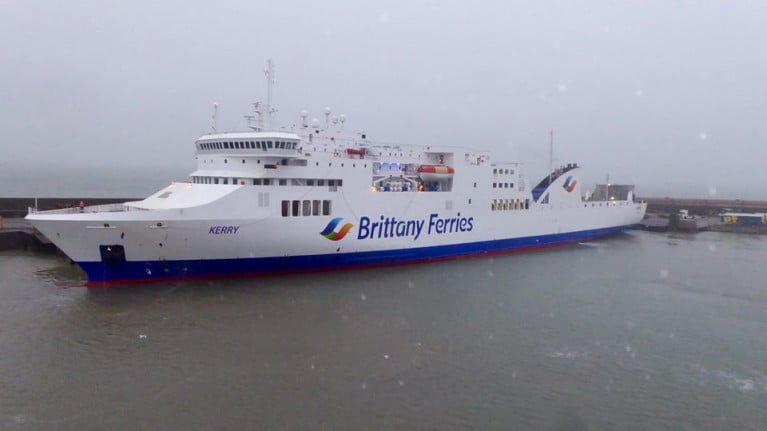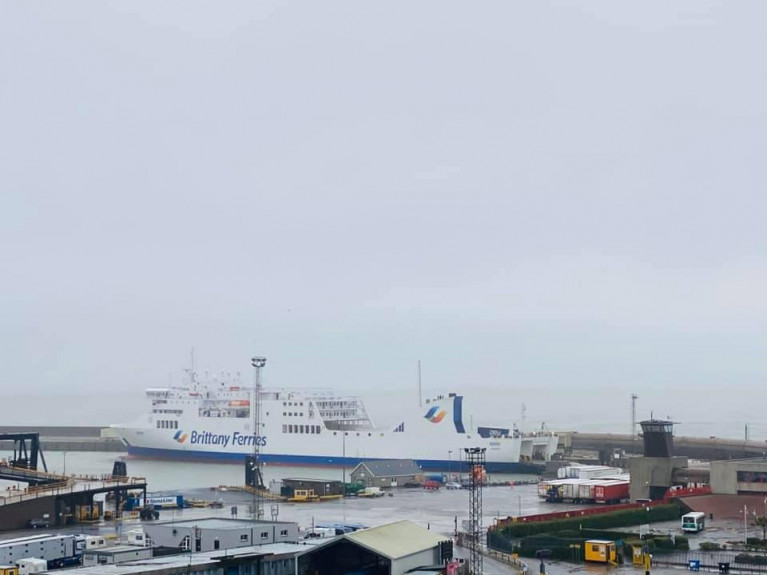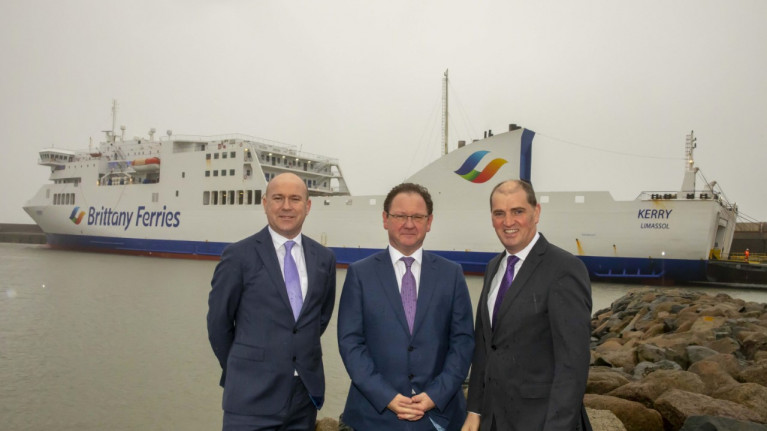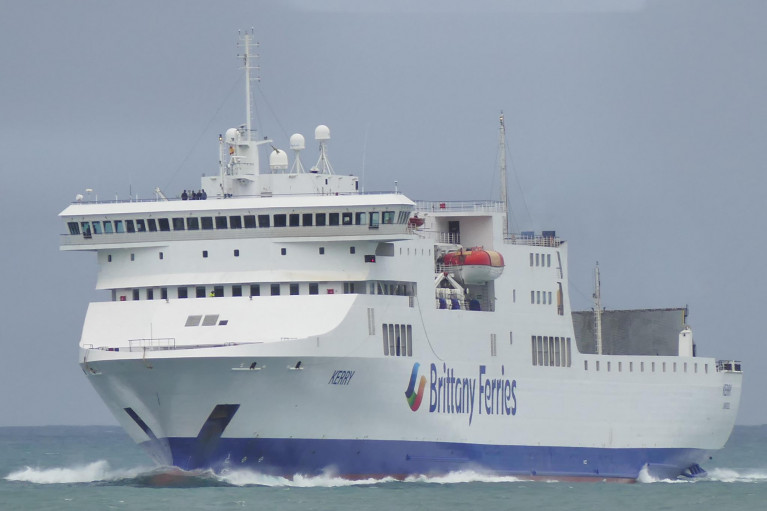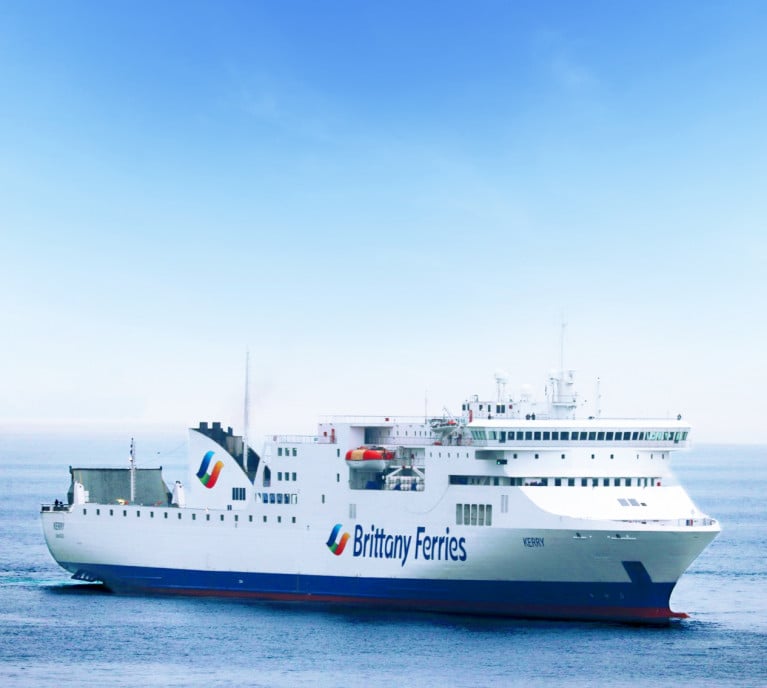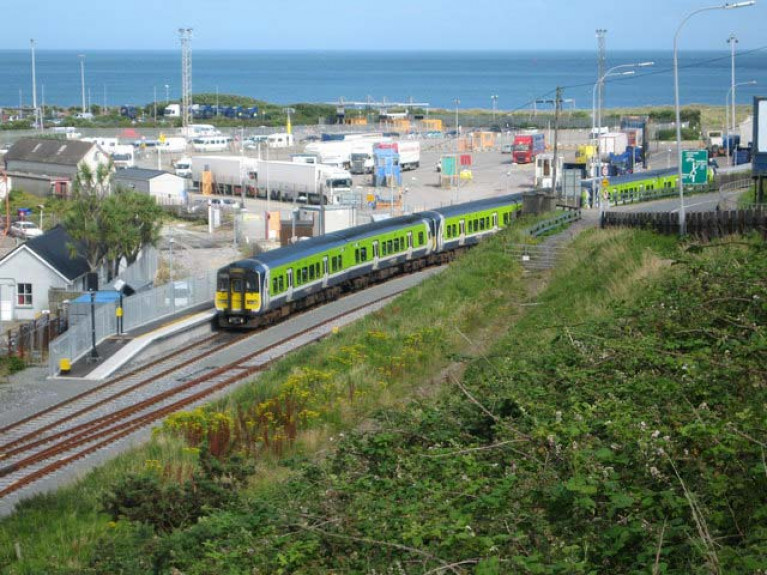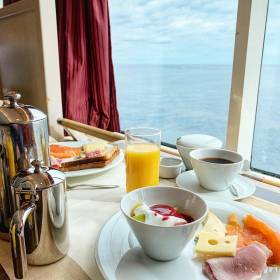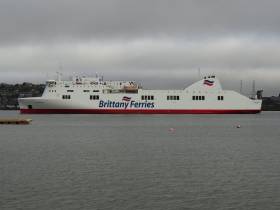Displaying items by tag: Brittany Ferries
Further Suspension of Brittany Ferries’ Passenger Services Notably Rosslare to France & Spain
There is further suspension of Brittany Ferries passenger services as a consequence of the on-going Coronavirus (COVID-19) crisis which Afloat adds the French ferry operator has posted on its website, so click for updates.
According to Brittany Ferries this is in response to changing government policy in France, Spain and Ireland, and to protect all passengers and crew members at this difficult time. This decision has not been taken lightly, but has been taken in the best interest of all.
Changes France-Ireland routes:
Brittany Ferries will cease its weekly rotation connecting Roscoff in France with Rosslare Europort (however Afloat adds the new seasonal service was scheduled to start next Monday, 23 March). Afloat also adds the seasonal Cork-Roscoff route was to begin tomorrow, St. Patrick's Day, however sailings have been re-scheduled to Saturday, 11 April, according to their 'Irish' website.
The French operator added that the Kerry will however continue two rotations per week, carrying freight between Rosslare and Bilbao in Spain as Afloat previously reported on Saturday. (Since then Afloat adds the ropax ferry was tracked this afternoon arriving at Rosslare with the last 'passenger' service prior to becoming freight-only).
We are systematically contacting all affected customers by telephone, email and SMS but there is enormous pressure on our contact centre staff. The speed of response may not be up to its usual standard for which Brittany Ferries apologises in advance. Passengers are being asked not to contact us by telephone but to visit website: www.brittany-ferries.co.uk/routes/sailing-updates (scroll down for Irish routes) for the latest information.
Brittany Ferries very much regrets the effect that this ongoing disruption will have on customers. Directors will continue to monitor the situation with a view to resuming normal service as soon as the situation allows.
We respectfully ask all customers who are not booked to travel within the next two weeks to delay contacting our customer call centres. In addition, normal two-way interaction via social media may not be possible due to the volume of enquiries and availability of staff. Brittany Ferries apologises in advance for delays in usual response times.
As outlined below there are other changes on Brittany Ferries network from the UK to France and Spain.
Changes UK-France routes:
- Cherbourg to Poole service – Barfleur (until 23 March at least)
The last sailing will leave Cherbourg tonight 16 March 2020 at 21:45 for Poole.
- St Malo to Portsmouth service – Bretagne (until 24 March at least)
The last sailing will leave St Malo on Tuesday 17 March at 20:30 for Portsmouth
- Roscoff to Plymouth service – Armorique (until 26 March at least)
The last sailing will leave Roscoff on Wednesday 18 March at 15:00 destined for Plymouth
As things stand, sailings between Portsmouth and Caen on Mont St Michel and Normandie will continue as normal, for passengers and freight.
Changes UK-Spain routes:
For now ships serving routes connecting Spain with the UK will continue to sail. However, they will only carry passengers who must return home, therefore offering a lifeline-only service for British and Spanish whose travel is essential. Freight will continue to be carried as normal.
Brittany Ferries Maintains Freight to Spain But Suspend 'Passengers' On New Rosslare-Bilbao Route
Ferry operator Brittany Ferries has outlined a series of immediate changes to its schedules, in response to the on-going Coronavirus crisis.
On 12 March, the French government announced steps to protect its citizens.
According to the company employing all-French crew, Brittany Ferries announced that they must also respond quickly. It must prepare for the possibility that many crew may not be available to work, either through self-isolation or because they are caring for family members at home.
In addition the Spanish government has announced a state of alert, applicable from 14 March. This follows a significant increase in Coronavirus cases and advice from the UK Foreign and Commonwealth Office guidance advising citizens to avoid travel to certain regions of Spain.
The measures are therefore designed to ensure sufficient crew are available to operate as many services as possible, while responding to the dynamic political situation in Spain.
The following changes will apply until at least 9 April 2020:
(AFLOAT adds for information from the Irish Government, click HERE and including Travel advice this LINK plus the Irish Dept of Foreign Affairs website).
Ireland-Spain
Brittany Ferries’ Kerry service operating between Rosslare and Bilbao will take only freight. The last passenger service will leave Bilbao tomorrow at 12:00 on Sunday 15 March bound for Rosslare. This change applies until at least 9 April 2020. For sailings schedule click HERE.
Ireland-France
Following dry-docking in Poland, Pont-Aven (as Afloat reported) the flagship will not return to service on Tuesday as planned on 17 March (St. Patrick's Day) until at least 9 April 2020. Pont-Aven was scheduled to serve the following destinations: Portsmouth-Santander-Plymouth-Roscoff-Cork. For sailings click HERE.
These changes will be reviewed by directors in the days and weeks to come. All passengers with existing reservations will be offered a full refund. Where possible - and acceptable to the traveller - alternative arrangements will be made on other Brittany Ferries services.
“On behalf of everyone in the company, I would like to apologise for the significant disruption this will cause to many customers,” said Christophe Mathieu, CEO Brittany Ferries. “However, under the extraordinary circumstances of the current crisis, we have no option but to take decisive action now to respond to the challenges we face. We thank everyone for their understanding at this difficult time.”
It is likely that customer relations teams in all markets will be extremely busy in the days to come. In addition, normal two-way interaction via social media may not be possible due to the volume of enquiries and availability of staff.
Brittany Ferries apologises in advance for delays in usual response times.
Click here for further information on changes to some of the operators other routes.
Brittany Ferries ropax ferry Kerry which completed a repositioning voyage to Rosslare Europort earlier today has since departed having embarked on an inaugural direct sailing to Bilbao in northern Spain.
- First Rosslare to Bilbao sailing today, Friday, 28th February
- First French rotation (to Roscoff) next month on Monday, 23rd March
- Move welcomed by Irish and Spanish hauliers
The new route out of Rosslare in Co. Wexford according to Brittany Ferries has been welcomed by hauliers given the port’s proximity to Dublin and the east coast road network. Equally hauliers operating on the European mainland have welcomed the move to Bilbao, a port more attuned to freight traffic with easier transport links into the Iberian Peninsula.
While primarily aimed at the freight market into Europe, the route will also carry holidaymakers to both Spain and France (noting new route also to Roscoff). It will be part of Brittany Ferries ‘économie’ service, offering a comfortable, no-frills voyage. Sailings will be twice-weekly and will incorporate a weekly Ireland/France rotation.
Speaking at the launch of the new route to Spain, Brittany Ferries Group Freight Director, Simon Wagstaff: “I am delighted to be here for the first Brittany Ferries sailing from Rosslare. Since we opened operations linking Ireland and Spain in 2018 we have listened carefully to feedback from freight customers, on what is predominantly a route for commercial traffic. The clear message was that a move to Rosslare would help them and us deliver a more attractive option to the UK landbridge. We now operate from two ports in Ireland, reinforcing our commitment to the country, its people and its economy.”
Glenn Carr, General Manager, Rosslare Europort added: “We are delighted to welcome Brittany Ferries’ Kerry to Rosslare Europort today. We look forward to working with Brittany Ferries to building a successful partnership to serve freight and passenger customers. The decision to introduce this service not only shows the appeal of Rosslare Europort to shipping lines, freight and tourism customers, but also is the first of what we intend to be a number of new business announcements, building on our €25 million investment plans in port facilities, infrastructure and technology".
Carr added "Rosslare Europort is Ireland’s closest port to mainland Europe, and is now the only port outside of Dublin with a Border Inspection Post facility, and will provide the quickest direct services for exports and imports to both Europe and the UK post-Brexit".
The new Rosslare to Bilbao route will open for passenger bookings online in early March but customers can now book through the Brittany Ferries reservations team by phone on 021 427 7801. Our Freight Reservations team can be contacted on +44 (0)330 159 5000.
Storm Jorge Forces to Revise Tomorrow's Maiden Sailing Departure On New Ireland-Spain Route
Bad weather has brought forward the departure time of Brittany Ferries maiden commercial crossing tomorrow on the new Rosslare-Bilbao, Spain route, writes Jehan Ashmore.
The looming weather system of Storm Jorge as named by the Spanish met office, has forced in the re-scheduling of the inaugural Brittany Ferries sailing on the new Ireland-Spain service. The launch of the Iberian service will be a first for the French operator to provide a passenger ferry service using Rosslare Europort.
Afloat has consulted the Brittany Ferries website (sailing updates) which cites due to poor weather, (the sailing from Rosslare at 23.30) will now instead depart at the earlier time of 11.00 (tomorrow morning), Friday, 28 February.
An expected arrival into Bilbao is at 08:00 on Saturday, 1 March and the operator added their apologies for the inconvenience caused. For the latest sailing information click here in addition to the operators Reservations Team on (021) 427 7801 (Mon - Fri: 09:00 - 17:30).
The new twice weekly Ireland-Spain route to be operated by ropax Kerry, replaced the Cork-Santander service which ceased recently after a two-year trial period when launched by ropax Connemara. The route received enouraging passengers numbers however Brittany Ferries added the closure arose from freight figures that were not robust and hauliers expressed better road connections and shorter driving distances.
In addition to the relocation of both Irish and Spanish ports, the Kerry will also serve Brittany Ferries which is to launch another new Rosslare to Roscoff route on a weekly return basis starting next month on Monday, 23 March.
This route in addition to Rosslare-Cherbourg was not revived in 2019 as Irish Ferries abandoned these French routes based out of the 'Europort' following the introduction of newbuild W.B. Yeats serving Cherbourg but out of Dublin Port from where the cruiseferry currently operates on the Irish Sea during the winter months to Holyhead. The company however on the St. Georges Channel continue to operate through the Wexford port to Pembroke Dock in Wales.
Likewise of the former Britanny Ferries Cork based route to Spain, Kerry will continue to provide an économie service ship to compliment the weekly seasonal offering from Cork to Roscoff, operated by flagship cruiseferry Pont-Aven.
Afloat this morning tracked Kerry having departed Santander for the final time last night as the ropax makes a repositioning crossing across the Bay of Biscay bound for Rosslare Europort.
The Cypriot flagged ropax is due to arrive in the Co. Wexford ferryport tomorrow morning around 07.30 and remain until the revised morning departure sailing to Spain.
Also tracked by Afloat is Pont-Aven which recently had a new engine installed while in dry-dock at the Remontowa Yard, Gdansk, Poland, following last year's fire on board as previously reported.
The incident caused damage to one of the ferry's port-side MAK 12VM43 engine units resulting in the cruiseferry running on the three remaining engines during 2019 which caused disruption and cancelled sailings. Also berthed nearby at the Polish shipyard is Irish Ferries cruiseferry Ulysses. Afloat will have more to report.
As for the resumption of Brittany Ferries Cork-Roscoff seasonal service, this is scheduled to start with the first inward sailing from France departing on Friday, 20 March. The corresponding outward sailing from Ringaskiddy in lower Cork Harbour is to take place the next day, Saturday, 21 March.
Operator Brittany Ferries Maintains Commitment to Ireland-Spain Route But Relocates Port to Rosslare
In an announcement Brittany Ferries is to move its Ireland/Spain sailings from Cork to Rosslare Europort, with the first sailing due to take place on 28 February. The new Spanish arrival port from Rosslare will be Bilbao as Afloat also reported yesterday.
The French ferry company nevertheless emphasised its continuing commitment to its popular Cork-Roscoff route which celebrated its fortieth anniversary in 2018. Each year the Cork-Roscoff route carries nearly 100,000 holidaymakers between Ireland and France.
“This was not a decision we took lightly and follows extensive consultation with our freight customers who sought better road connections and reduced driving distances,” said Christophe Mathieu Brittany Ferries CEO. “We opened the route in 2018 with a two-year trial window. While passenger numbers have been encouraging, the reality is that freight numbers, which are key to route viability, were not sufficiently robust. However I want to make it clear that we remain committed to Cork, with our flagship Pont-Aven cruise-ferry service to Roscoff. We’re also committed to an Ireland-Spain route, now via Rosslare, and we’ll look after existing passengers whose future travel will be affected by this change.”
All customers already booked on affected sailings from the Port of Cork (see: response) will be given the option to transfer their booking to sailing between Rosslare and Bilbao/Roscoff. An allowance will be given to cover additional transfers. Alternatively, a full refund will be provided to those who choose to cancel.
The Cork-Santander route which was launched in 2018 was primarily aimed at the freight market into Europe although it also carried holidaymakers, with an ‘économie’ no-frills onboard experience. The new route out of Rosslare will again concentrate on freight with an option for holidaymakers.
Glenn Carr, General Manager, Rosslare Europort said: “We are delighted to welcome Brittany Ferries to Rosslare Europort. This new Rosslare to Bilbao service will be attractive for trade and tourism alike. We very much welcome that this service is being launched because of demand from freight customers, due to Rosslare’s strategic position and access to key markets. Brittany Ferries will also benefit from our €25 million investment in port facilities, infrastructure and technology, as part of the Port’s strategic plan. We look forward to working closely with Brittany Ferries to ensuring the success of their new service.”
Why Rosslare - Bilbao?
- Rosslare-Bilbao replaces Cork-Santander as key freight route to Europe
- The change is in response to demand from Irish and continental hauliers
- Company confirms ongoing commitment to Cork-Roscoff, which will continue to be primary tourism route
- New Rosslare services will include an Ireland-France rotation to Roscoff
- Rosslare sailings to commence 28 February 2020
The consensus among hauliers is that Rosslare, with its proximity to Dublin and the east coast road network, is a preferred option. Equally hauliers operating on the European mainland noted that Bilbao is more attuned to freight traffic and has easier transport links into Europe. Detailed discussions also took place with the Ports of Cork and Rosslare. The company has confirmed that Cork-Roscoff will remain a vital route for tourism, both into and out of Ireland.
As with the current Cork-Santander sailings, the new Rosslare-Bilbao sailing will be twice-weekly and will incorporate a weekly Ireland/France rotation. It is expected that despite the concentration on freight, the route will carry a number of holidaymakers to both Spain and France. This has been the experience with the existing Cork-Santander route.
Rosslare Europort has welcomed the announcement by Brittany Ferries that it is to launch its new Rosslare Europort to Bilbao twice-weekly service from 28th February 2020. In addition, the French-owned shipping line will also operate a weekly Rosslare to Roscoff service during the peak season (March to October).
Earlier today, Port of Cork responded to the decision by Brittany Ferries to depart Cork Harbour ending a link from Ireland's second city to Santander in Spain.
The arrival of Brittany Ferries means that Rosslare Europort will now offer business up to seven weekly sailings in each direction between Ireland and mainland Europe, cementing the port’s status as Ireland’s Gateway to Europe.
Brittany Ferries will be Rosslare Europort’s fourth major shipping line customer, and along with Stena Lines, Irish Ferries and Neptune Line, offers both freight and passenger customers a comprehensive range of connections to both mainland Europe and Britain.
Rosslare Europort’s General Manager Glenn Carr said “this is an exciting and positive announcement which not only shows the appeal of Rosslare Europort to shipping lines, freight and tourism customers, but also is the first of what we intend to be a number of new business announcements, building on our €25 million investment plans in port facilities, infrastructure and technology. Rosslare Europort is Ireland’s closest port to mainland Europe, and is now the only port outside of Dublin with a Border Inspection Post facility, and will provide the quickest direct services for exports and imports to both Europe and the UK post-Brexit.”
The appeal of Rosslare for business is improving all the time, with the port providing a real alternative for the movement of RO-RO, RO/Pax traffic to and from Ireland, with berth capacity, storage availability and the improving road networks connecting to the port - including the opening today of the New Ross Bypass on the N25.
As Port Authority, Iarnród Éireann is committed to investing in the port to ensure its growth and support both for the region and the wider economy. Port management is continuing discussions with existing and potential new shipping lines, and will continue to explore new possible routes with Ports in France, Belgium and the Netherlands.
Carr continued “we have had tremendous local support from the business, tourism and local authority stakeholders in the region as we develop our plans, and we look forward to continuing to strengthen the role of Rosslare Europort in the regional and national economy.”
French Operator Brittany Ferries Turns the Tide on Plastic Waste
French operator, Brittany Ferries is realising the benefits of its drive to reduce and eventually eliminate the use of single use plastics on board its fleet of ferries by purging almost 5.7 million items of plastic per year.
The operator has a network sering the UK, France, Spain and Ireland. Over the last 18 months the company has been purging its onboard restaurants and cabins of single use plastic items, including cutlery, cups, lids, stirrers and straws.
Altogether 5,664,400 items of plastic have been eliminated per year, including over two million cups. In their place have come environmentally friendly alternatives made from bamboo, cardboard, paper and wood. If all these items were placed end to end, they’d stretch over 400 miles – the distance from London to Edinburgh.
Already the vast majority of meals consumed on Brittany Ferries ships are served on china plates alongside stainless steel cutlery, whilst most drinks are already served in glasses and china cups.
Other measures include the replacement of disposable shower gel sachets in cabin bathrooms with dispensers filled with eco-friendly gels, and the elimination of plastic bags in dustbins.
“The sea is our home, so of course we’re deeply aware not only of its beauty, but also its fragility,” says Brittany Ferries CEO Christophe Mathieu. “By tackling single use plastics we are determined to take responsibility and make a significant contribution to collective efforts to protect the seas upon which we sail. I’m delighted to see this project already bearing fruit.”
“We couldn’t have done this alone: we’re working closely with our suppliers to raise standards and to find innovative and creative solutions. And we’re also working with our customers and colleagues, who are increasingly driving our efforts to make changes. We want to make it easier for them to consume and recycle in line with their and our values whilst they’re on board our ships.”
“For sure, there’s much more to do, but this is a positive step forward, part of our long term mission to incorporate sustainability into everything that we do.”
In 2020 the company will renew its focus on airborne emissions when it welcomes its first LNG-powered ship, Honfleur as Afloat reported previously.
In addition a further pair of E-flexer class newbuilds are to follow: Salamanca in 2022 and Santoña in 2023. The trio will be amongst the first ferries of their type to be powered by Liquefied Natural Gas (LNG).
The introduction of LNG powered tonnage will offering significant environmental advantages (see cutting CO2) over traditional marine fuels, burning more efficiently and producing no sulphur, virtually no particulates and 95 per cent less nitrogen dioxide.
Channel Islands operator Condor Ferries has been sold to an investment consortium involving Brittany Ferries, ending months of speculation.
The French ferry operator reports ITV News, have acquired a 25% stake alongside new majority owner, Columbia Threadneedle Investments.
The current owners, Macquarie Infrastructure and Real Assets (MIRA) announced they have reached an agreement with the new owners to take on 100% of Condor Ferries.
Contracts have been signed and the deal is expected to be finalised following scrutiny from regulatory bodies.
The company carries 1 million passengers between Guernsey, Jersey, the UK and to St Malo in Brittany.
More here on this ferry development.
For coverage of Condor/Commodore's 70th anniverary in 2017 click here.
Brittany Ferries Celebrates Another French-Flagged Ship As Connemara Relocates from Ireland Routes
Brittany Ferries’ Connemara has been welcomed today to the shipping register of France, creating jobs for French seafarers and bringing to 11 the number of ships of the fleet sailing under the red, white and blue of the tricolour.
Afloat adds that ferry Connemara at the end of October completed its final Cork-Santander sailing, however another ropax Kerry has taken over on the year-round operated Irish-Iberian link by crossing the Bay of Biscay with an arrival to the Spanish port this morning. A previous scheduled sailing was cancelled due to adverse weather conditions which led Kerry vacating the ferry linkspan at Ringaskiddy terminal. Afloat tracked the ropax upriver in Cork Harbour at the Marino Point jetty.
As for the seasonal Cork-Roscoff route, Pont-Aven carried out the final crossing of 2019 departing the Irish port last Saturday. Services resume in March 2020.
Returning to Connemara, Brittany Ferries add that the ropax originally joined the fleet in May 2018 to open a new route between Cork and Santander – the first ever direct ferry route between Ireland and Spain. The chartered ship (Afloat also adds served Cork-Roscoff) had initially sailed under a European flag, but with a clear commitment that it would be transferred to the French register and crewed by French sailors after two years of operation.
This commitment has now been fulfilled six months early, allowing for the creation of 111 jobs for French crew-members, including 25 officers.
“We’re delighted and proud to raise the French flag aboard Connemara,” says Brittany Ferries CEO Christophe Mathieu. “Despite the current uncertain economic and political waters we’re navigating Brittany Ferries continues its development, and reaffirms its long-term commitment to the French flag, and its position as the biggest employer of French seafarers.”
Following regulatory checks by maritime authorities in Spain, France and UK, Connemara will sail for the first time under the French flag on 13th November, operating a service from Santander in northern Spain to Portsmouth, UK. During December it will link Poole with Cherbourg, covering for fleet mate Barfleur which will undergo an extensive refit. Then in January 2020 Connemara will begin operating services between Portsmouth and Le Havre.
Connemara is at the vanguard of a wave of French-flag ships which will arrive over the next four years as part of a €550 fleet renewal programme.
Honfleur will be delivered from the German FSG shipyard in 2020 and will serve the Portsmouth-Caen route. This is to be followed by three brand new ‘E-Flexer’ class ships to serve longhaul on UK-Spain routes: Galicia in late 2020, Salamanca in 2022, and Santoña in 2023.
Sailing for 300 Passengers Cancelled Hours Before Brittany Ferries Crossing
Some 300 passengers and their travel plans have been disrupted this weekend, reports the Irish Examiner, following the last-minute cancellation of Brittany Ferries sailings between Cork and Santander.
Passengers received texts (yesterday) morning advising that tonight's 10.30pm ferry from Ringaskiddy, Co. Cork to Santander in northern Spain, was cancelled due to a technical problem.
One passenger, Bernice Russell, from Cork, said initially they were told the ferry would leave instead at 9am on Saturday morning, but that too was cancelled.
For more on this story click here.
Afloat.ie adds that the next sailing on the year-round route to Spain scheduled for next Monday has too been cancelled as according to Brittany Ferries. For the latest information this can be found on the operator's sailing updates page by scrolling down for Irish routes.
Afloat.ie also adds that the ferry concerned the Connemara had to vacate the single-linkspan at Ringaskiddy so to enable fleetmate Pont-Aven to berth at the terminal as it operates the Cork-Roscoff route at the weekends. The flagship is scheduled to depart to France today at 16.00hrs.
As for the whereabouts of the Connemara, the 500 passenger capacity ropax proceeded upriver of the River Lee to the Marino Point jetty which as Afloat previously reported is to be redeveloped.


























